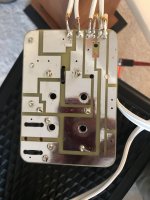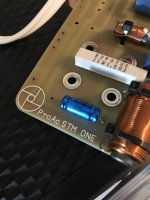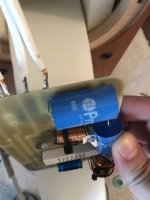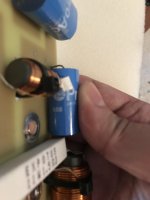thanks man.
yeah as soon as I take the xo off I will make my shopping list and build an external xo to play with.
I have clips, have a weber station soldering iron, all the rest of the crap.
it’s not like this is my first rodeo.
i learned from the best in modding my Marshall’s years ago. And it was a blast and a great learning experience.
again. I don’t think many people understood my intentions or my outlook on these things.
nothing is ‘ wrong’ with the speakers.
i love to tinker in any hobby I do.
i love the learning experience.
who cares if I blow some money on it while doing mods ?
that’s part of the fun for me.
i have a ton of guitar tube amp parts. NOS caps, resistors, guitar speakers, etc
I can’t even go over the list of guitar stuff I have.
and at 52 I have the disposable income to do it.
yeah I could go out and buy a way more expensive pair of speakers. So?
not bragging about that at all honestly.
it’s just not fun to me.
plus the more I learn about my speakers and what makes them tick, the better I will be able to choose future speakers I buy.
nothing is sacred to me in tinkering.
i modded my vintage Marshall’s. So?
they aren’t Rembrandt’s.
lol
more to come lads.
yeah as soon as I take the xo off I will make my shopping list and build an external xo to play with.
I have clips, have a weber station soldering iron, all the rest of the crap.
it’s not like this is my first rodeo.
i learned from the best in modding my Marshall’s years ago. And it was a blast and a great learning experience.
again. I don’t think many people understood my intentions or my outlook on these things.
nothing is ‘ wrong’ with the speakers.
i love to tinker in any hobby I do.
i love the learning experience.
who cares if I blow some money on it while doing mods ?
that’s part of the fun for me.
i have a ton of guitar tube amp parts. NOS caps, resistors, guitar speakers, etc
I can’t even go over the list of guitar stuff I have.
and at 52 I have the disposable income to do it.
yeah I could go out and buy a way more expensive pair of speakers. So?
not bragging about that at all honestly.
it’s just not fun to me.
plus the more I learn about my speakers and what makes them tick, the better I will be able to choose future speakers I buy.
nothing is sacred to me in tinkering.
i modded my vintage Marshall’s. So?
they aren’t Rembrandt’s.
lol
more to come lads.
Bazooka...quicker but maximal risk! But very good at solving subjective problems.
now THAT is funny.
lmao.
yup it sure does.
and again there are no problems. Just having fun.
cheers
Beryllium copper aka 'spring copper'? You'll shoot your eye out.after giving it some thought I agree and decided a week ago that I’ll prob throw in a beryllium scan speak tweeter in there.
What you want is titanium...
Nothing wrong with that.again. I don’t think many people understood my intentions or my outlook on these things.
nothing is ‘ wrong’ with the speakers.
i love to tinker in any hobby I do.
i love the learning experience.
who cares if I blow some money on it while doing mods ?
that’s part of the fun for me.
But honestly for a fraction of the cost of the beryllium tweeters you can buy measuring equipment (calibrated mic and pre-amp). Only in this way you can go in the right direction and learn something.
Ralf
The word 'calibrated' has lately become synonymous with a USB mic. It is not recommended to get a USB microphone for crossover work.
Nothing wrong with that.
But honestly for a fraction of the cost of the beryllium tweeters you can buy measuring equipment (calibrated mic and pre-amp). Only in this way you can go in the right direction and learn something.
Ralf
i already have a minidsp mic and have been doing measuremnts in my room for years.
below is my latest RT60 decay measurements. Which are amazing for my really bad room.
thanks!
My friend bought and tried UMIK1 a long time ago, he says that it is quite ok to work with. I have an old DIY measuring system with the Panasonic WM-61A, it still works well. We are amateurs, that's all.
It's all right. 😎 I just wanted to say that these cheap microphones have been tested and are doing the job. As far as I remember with UMIK1, the only limit is no more than 5m USB cable. Also, a stand must be improvised for such microphones.
I also tried Dayton IMM6 but didn't get good results with my phone.
Every serious audiophile should first get a microphone to measure their speakers in the room, and only then draw conclusions. This can save a lot of money, among other things. And if they are persistent and not afraid of soldering irons, they can fix things a bit.
I also tried Dayton IMM6 but didn't get good results with my phone.
Every serious audiophile should first get a microphone to measure their speakers in the room, and only then draw conclusions. This can save a lot of money, among other things. And if they are persistent and not afraid of soldering irons, they can fix things a bit.
Last edited:
Its biggest limit is the USB interface. Perfectly fine for measuring FR in a room, but not for designing a crossover. For this purpose you need a consistent timing, something you won't get from the USB interface.As far as I remember with UMIK1, the only limit is no more than 5m USB cable.
Also it needs a mic stand, but this is the same for every mic.
Ralf
Yes, and the difference is not that much. External good second hand sound cards are plenty. Around 100 bucks you can have a calibrated individually measured mic with its own calibration file and not the factory one like with umik. One of the best tools I ever purchased with a soldering station with regulated temp.
Ralf is right. Even a budget USB interface and a cheapskate mic like the Behringer beats the minidsp for speaker design.
Attachments
Last edited by a moderator:
Cause I am going to change out the tweeter for something better
and make an external xo with better parts
and make an external xo with better parts
Ok, I would stop worrying about better parts and concentrate first on getting the right values.
Inductors measure as follows.
Tweeter - 0.22mH. DCR 0.3ohms
Bass - 1.63mH. DCR 0.3ohms
now I didn’t take them off the circuit as I measured with my LCR meter.
because I measured the resistor on board and it was 1.6ohms. Minus .1 from the resistance of the LCR meter leads.
the cap values you can see from the pics
Tweeter - 0.22mH. DCR 0.3ohms
Bass - 1.63mH. DCR 0.3ohms
now I didn’t take them off the circuit as I measured with my LCR meter.
because I measured the resistor on board and it was 1.6ohms. Minus .1 from the resistance of the LCR meter leads.
the cap values you can see from the pics
If you can post a photo taken from component side and indicate which wire go to which driver, it will be easier to draw a schematic.🙂

- Home
- Loudspeakers
- Multi-Way
- 'Upgrading’ my tweeters (can I do this?)



